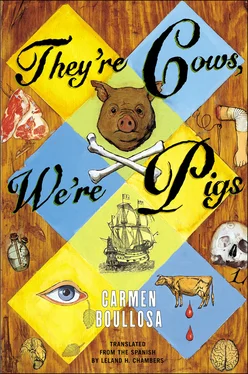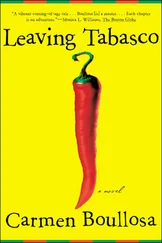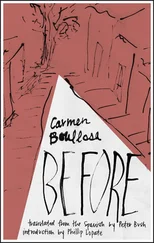One of those first afternoons, still somewhat disconcerted to realize I was on a voyage I had never imagined, never sought out, a voyage fallen out of nowhere on no particular day when I was drifting about without a glimmer of change in the seat of my poverty, as if the voyage were the fruit of the immeasurably deep dreams of a magician who knew how to obtain substance out of nothingness, a voyage which materialized only because I had heard about a man who was looking for hands to indenture themselves with the French West Indies Company and I’d gone to meet him — one of those first days aboard ship, as we were saying, with my vacant eyes fixed on the striations in the wood, one of the other youths with whom I share this voyage approached. He seemed like a quiet, shy youth, moving around very little, and then with hesitant, small steps, although with body erect, avoiding all the talking and joking around; who, when we went up on deck to pick up an earthenware or perhaps wooden bowl or saucer with our daily portion of hot food (which was always most foully prepared by the older sailors and cooked or boiled over an iron grate above hot coals on a bed of sand on the deck, in huge cauldrons into which they reluctantly tossed — apparently no one paid any attention to what was going in next to what — garbanzos, rice, chunks of meat, garlic, capers, anchovies, almonds, prunes, chopped quinces, mustard, dried fish, stale bacon, sardines, lentils, and not very much of any of this, quite true, but all piled in together; in fact the only things on the ship that were safe from the cauldrons were the biscuits, honey, wine, and a cow we carried on board to provide milk and cheese for the privileged passengers — among whom I was not to be found, of course. Together with water for drinking, such were the provisions the Saint Jean carried for those who belonged to the Company; but each passenger who did not was responsible for his own supplies, and this often without much sense of how it should be done, because their improperly salted meat soon spoiled, their grain and biscuits rotted, and sometimes even the skins for holding their wine or water turned sour, reason enough that, throughout the crossing, these ears heard complaints time and again about the scant pleasures of their meals, heard painful laments from those who suffered hunger and wild thirst because of their lack of experience in preparing their stores while still on land), when, as I was saying, we were on deck to get our daily ration of hot food (mornings and evenings they sent biscuits and seeds down into the hold where we slept so we would be out of the way), he would stand off to the side as if he were a person of quality, the kind who normally eats with a silver spoon, although this was not so, as his impoverished manner of dress made clear, and would stand apart from the clusters of boors and cutups who used their fingers to shove this vile, nearly inedible food into our own rankled but always famished mouths.
It was not his odd melancholy bearing alone that made this youth so noticeable. He also stood out because of his beautiful features, though, if truth be known, it may be that I had not realized this before the event I am going to tell of. Like many of us, he had not the slightest notion of any hair on his face yet, but the rosy tone of his skin, which one would have guessed to be extremely soft, was much better than that of any of us. That afternoon I certainly was not thinking of this, of course, nor was I thinking of anything else: as if — in order to get used to the idea that I was the one who was embarked on the Saint Jean and headed for the island of Tortuga, which I had heard a little about but always in some garbled fashion — I needed to slip into a sort of mental vacuum, close to boredom. And that was easy enough to manage because by this time we had left dry land behind several days back, and the greater part of the time we spent shut up in what the crew pompously called the “company cabin” but which was nothing more than the ship’s hold and from which they allowed us to emerge only to snatch a peek at the ocean during the space of time they were spoiling our appetites with their filthy stew. If not how oddly this particular youth struck me, yet must I have been plunged into thought about something, anything whatever, for the blow to have fallen so cunningly and efficiently on so unsuspecting a being: on me, poor Smeeks, who was rocked from stem to stern when what I am about to relate took place. For example, I should have thought how strange it was that he had drawn so near me, he who had seemed to reject close proximity to anyone whatsoever, at least insofar as our crowded conditions permitted; I ought to have reacted long before this event took place that later on caused me so much grief and so little profit. Yes, the youth’s closeness should have disturbed me, but I did not see him; moreover, I certainly ought to have begun to wonder when he started to address me, and even more so at the tone of his voice. I do not know what he told me at first, but when he did succeed in getting my attention, he asked my name (I did not ask for his) and went on talking to me in his soft, gentle voice about things I did not believe important but that were pleasant and soothing while surrounding me with a friendly warmth which without equivocation I could call “trustingness,” and which prevented his nearness, gradually growing, from having any negative significance for me, to the point where his body and mine seemed glued to each other at the ribs, and his unceasing, evenly placed words finally managed to impress themselves upon me only by the movement with which he expelled them from his mouth.
Suddenly, without the slightest violence but simply utilizing the rhythm of his speech, he grasped my hand and pushed it inside the clothing covering his breast, down to the skin, and at the same time, almost interrupting the sensation in the palm of my hand beflustered by the shape it was touching, he asked, looking me straight in the eye, “Have you ever touched a woman before?”
And without waiting for my reply, not even moving my perplexed, motionless hand from her breast, she added, “More men have touched me than everyone on this ship. But that’s finished now, I want you to know. That’s why I’m changing lands. And I would rather pass as a man, though I despise all such beings, than go on being a whore. That’s all over and done with.”
Repeating that last phrase, she now angrily removed my hand from her body and her clothing — as if I had put it there on my own in the first place! — and brusquely stepped away from my company with a glance full of an intense fury that consigned me to the category of the enemy, and joined a group who were killing time exchanging stares with one another, lacking any conversation to raise them out of the doldrums of their boredom, because there was no other place to accommodate them and they were tired of looking at the striations in the wood planks. Not for a moment did I remove my gaze from her; I did not know if she would want to trust everyone else with what she had used for wounding my hand — and up to that moment, only my hand — but which afterward would cut like a fatal illness through the rest of my body, my thoughts, my dreams, my appetite, my words … There was no worse place to find myself smitten by love, because there was absolutely nothing I could do for distraction!
On what remained of the voyage, and that was most of it, in fair weather or foul, I tried in every way to talk to her again, that loveliest of women dressed like a boy. But with equal obstinacy she took pains to avoid and ward off my gaze, and the most I could manage was that one day, only one other day, did she aim a few words in my direction, though it was not as if she were talking to me in particular; she spoke as if she were talking to someone who was not myself, to anyone at all, to the person I used to be and not this injured being whose whole body now bore the effect of that efficient weapon which her firm, gentle breast had become within me: “In the lands we are going to, I have heard it said that there is no ‘yours’ and ‘mine’ but that everything is ‘ours.’ And that no one asks, ‘Who goes there?’ and no doors are secured with locks and chains, because everyone is everyone’s brother. I have heard this said. And the only rule is that of loyalty to the brothers. To be one of them you cannot be weak, a coward, a woman. But even though I am a woman, I will see if I can fit in with that kind of life, because that is the best life.” Yet she did not look me in the eye while speaking to me; she talked so anyone could hear her, although this “anyone” happened to be me.
Читать дальше












